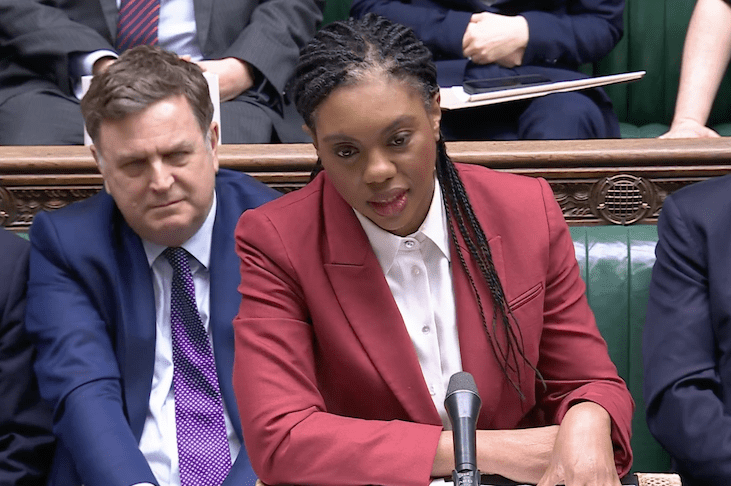Keir Starmer didn’t have to defend his welfare cuts until later in the session at today’s Prime Minister’s Questions, because Kemi Badenoch decided to focus on the looming increase to employers’ national insurance contributions. She was right to do so ahead of the spring statement, and her attacks were, for the second week running, much better than they have been previously.
Starmer and his whips had clearly anticipated that tax and welfare would be the two hot topics of the session, and they’d found a Labour backbencher sufficiently loyal and self-loathing to ask a totally pointless question just before Badenoch. Andrew Pakes praised Starmer for the ‘welcome boost in the pay packages’ for his constituents and for ‘ignoring the voices on the opposite benches with our plans to make work pay, and can I urge to him to go further and faster in delivering our plan for change for working people?’
How could Starmer possibly disagree with such a question? It also gave him the chance to remind the chamber that Badenoch opposed the rise in the minimum wage and thinks paternity pay is ‘excessive’. ‘They’ve learned absolutely nothing,’ he added.
Up popped Badenoch for her six questions. She once again branded the Spring Statement an ‘emergency budget’, asking why it was happening when Rachel Reeves had described her autumn Budget as a ‘once-in-a-parliament reset’. Starmer listed all Labour’s achievements on the economy, before saying the Tories had crashed it. Badenoch returned that ‘he knows why we’re having an emergency budget because since the last, since the Chancellor delivered her Budget in October, growth is down, borrowing is up, and she has destroyed business confidence’. She asked whether Starmer now regretted raising taxes on business. Starmer repeated his claims about the economy, citing ‘record investment’ and interest rates being cut. He added: ‘She talks about national insurance. We have to fill the £22 billion black hole.’ Badenoch was, he said, straight talking, so could she help with this question: was she going to reverse the NI increase? ‘If not, what’s the point? If so, what other taxes is she raising to fill the hole?’
Badenoch said the ‘only black hole is the one that he is digging’, and then became more specific about the problems with the NI hike. She pointed to an attempt later today by the Conservatives to exempt hospices, pharmacies and care providers from the national insurance rise. It is much harder for Labour to defend this, given these organisations are stretched to breaking point already, and given the emotive position they hold in society. Starmer deflected by returning to his point that Badenoch wasn’t saying whether the Conservatives were going to reverse the rise. He added that the government had ‘made provisions for charities.’
For once, Badenoch caught Starmer out, pointing out to the chamber that the Prime Minister had not made provisions, and when he insisted that the government had in the form of grants, she replied that this was for buildings, not for the salaries of staff working in hospices. Her final question called on the Prime Minister to rule out any ‘extension of the freeze in income tax thresholds ahead of the emergency budget’. Starmer mocked her, saying: ‘She’s got such pre-scripted questions, she can’t actually adapt them to the answers I am giving!’ He then carried on mocking the idea that Badenoch was a ‘conservative realist’, adding that ‘I’m realistic about the Conservatives: the reality is they left open borders and she was the cheerleader, they crashed the economy, mortgages went through the roof, the NHS was on its knees and they hollowed out the armed forces.’
The wind quickly went out of his sails, though, when the SDLP’s Colum Eastwood described a constituent who was due to lose her disability benefits, despite needing help to wash below the waist and go to the toilets. ‘After 14 years of the Tory government that many of us wanted to see the back of, can the Prime Minister answer one question: what was the point if Labour are going to do this?’
Starmer made a personal defence of the cuts, saying he had ‘lived with the impact of a disability in our family, through my mother and brother, all my life: I do understand the human impact of this’. But he added that the current system was ‘morally and economically indefensible’. Later in the session Diane Abbott took issue with this repeated ‘moral’ case for the welfare cuts. She argued: ‘Could we have less of this rhetoric about his £5 billion package of disability benefit so called reform being moral? There is nothing moral about cutting benefits for what may be up to a million people. This is not about morality. This is about the Treasury’s wish to balance the country’s books on the back of the most vulnerable and poor people in this society.’
The Prime Minister has not always been good at responding to Abbott with the respect she deserves, but today he was very careful. He praised her passionate campaigning over many years on this issue, but then said he did see it as a moral issue because the welfare state was currently preventing people from going into work. He said he was ‘genuinely shocked’ that there were a million young people in that position and he was ‘not prepared to shrug my shoulders’. But Abbott has her finger on the problem for the government, which is that it is currently eliding cuts and reform. Are ministers really overhauling the incentives, training and support, or are they just cutting the overall bill? If more Labour backbenchers reach the conclusion that Abbott has, then Starmer will be in trouble.
In fact, Badenoch could have done with linking the benefit cuts – which she didn’t mention – with her attack on the ‘jobs tax’. If the government wants to get people back into work, it makes little sense to increase the costs for employers of taking someone on.








Comments